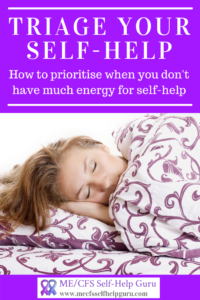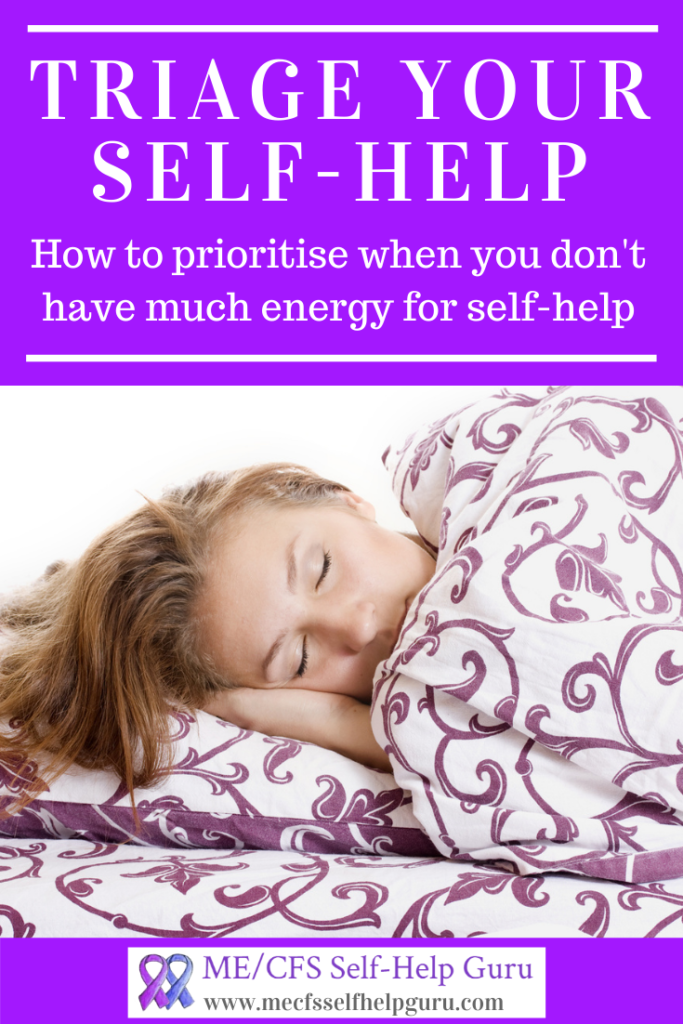How to prioritise when you don’t have much energy for self-help
This is an edited post I originally wrote especially for ProHealth’s Inspirational Corner and first appeared there in June 2018.
The fact that there are more than 101 ways to tackle energy limiting chronic illness has its upside and its downside. On the one hand there is huge potential for making things better. But on the other hand, as each thing tends to make only a small difference, it can seem an overwhelming task to do everything that will make enough of a difference.
Wanting to see results, we can so easily fall into the trap of putting lots of pressure on ourselves with thoughts like ‘I won’t get better if I don’t do that’ or ‘I should be doing this’. The reality is that we can’t do everything, and how much we can do depends on the severity of our symptoms and our day to day fluctuations.
My journey to my healthiest times with ME/CFS has always been based on taking one tiny step after another. Even though each step might not have seemed to make a huge difference at the time, it was extremely important in making the next step more possible. I learned that it’s so important to recognise the value of each tiny step because it will lead to you being able to take the next one!
I’ve also learned that the order of the steps is important. There is no point wasting energy on one aspect of self-help if you are ignoring another aspect that will get in its way. Unfortunately, the sicker you are, the more unpleasant your experience, the more desperate you feel to make a difference, and this desperation can actually feed into the illness mechanism that can make all other self-help an ineffective waste of energy. Here are the first 3 things to focus on before even considering putting energy into anything else:
1. Learn how to calm the sympathetic nervous system activity and engage the parasympathetic nervous system
When the sympathetic nervous system is active it is preparing our body for action. Our energy and nutrition are being lined up to deal with an impending emergency and are not going to be available for general well-being and healing. Any healing intervention we try is going to be less effective if we cannot engage our parasympathetic nervous system. Desperately trying to get better, putting pressure on ourselves to do things that might help, or worry about what we should be doing, are all going to keep us out of the relaxed state needed for our body to send its resources to healing.
When your energy is limited your number one self-help priority must be to stop wasting it on pressure, stress and worry. Easier said than done! But understanding the important value of being able to relax, accept, and let go of resistance and worry can help you want to build these skills. When you know that all else is pointless unless you can take this step, it’s easier to let go and focus. Self-compassion is absolutely crucial for being able to take this step. Worrisome thoughts will not suddenly stop coming to mind, however it’s how we deal with them that counts. If we can acknowledge the thought with compassion and understanding, we can then gently remind our self that it isn’t serving us and then choose to refocus on practising some kind of relaxation skill which will serve us better in the moment. I like to use the following words:
it is as it is, and that’s OK, all I need right now is to accept, let go and relax’.
2. Take a relaxed attitude to optimising sleep
Our time asleep is when our body gets its best chance to send our resources to repair and healing. However, efforts at improving sleep are going to be futile without first having developed skills to calm the sympathetic nervous system. This issue can also be a bit of a catch 22. Sleep difficulties tend to be an integral part of illness like ME/CFS, Fibromyalgia and Lyme disease, and we may not be able to solve them completely with self-help or even with unsustainable medication. The worry that we can’t get any further without improving our sleep will get in the way of any potential healing that is available. My approach has been to do whatever I can to optimise my sleep but accept imperfection. I aim to reassure myself that although sleep is important, resting well will be a close second best.
3. Learn new skills to live within your energy envelope
We’ve all experienced the consequences of pushing past our energy limits, we crash. It’s obvious that this does nothing for our healing. However, it takes a lot of skill to learn not to do this. We have many behaviour patterns that were successful when we had lots of energy which are now very dangerous. For example, pushing to get something finished even when you’re getting tired. Unlearning these kinds of automatic pilot behaviours and replacing them with ways of being that are more adaptive to present circumstance needs new skills. Without taking some time to learn these skills, we are constantly going to knock ourselves back. We also have to learn how to make wise choices about how we use our energy, and how to recognise and avoid energy draining situations.
 If you’re feeling overwhelmed by what you need to do to help yourself improve your health and well-being, remember that you only need to take one tiny step at a time. Each step will lead to the next being easier. But remember all other steps will be more effective if you can first learn to relax and let go, engaging your parasympathetic nervous system and allowing your bodies resources to be directed towards healing.
If you’re feeling overwhelmed by what you need to do to help yourself improve your health and well-being, remember that you only need to take one tiny step at a time. Each step will lead to the next being easier. But remember all other steps will be more effective if you can first learn to relax and let go, engaging your parasympathetic nervous system and allowing your bodies resources to be directed towards healing.
Image courtesy of Irina at Yayimages.com






